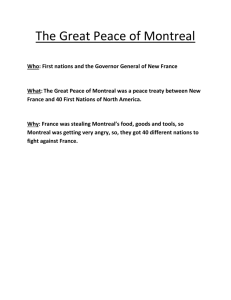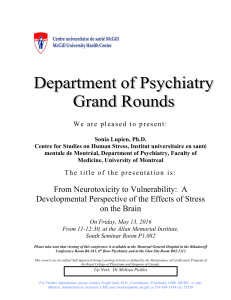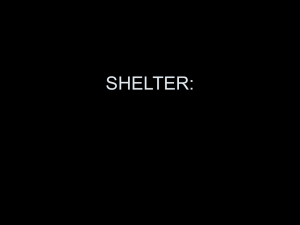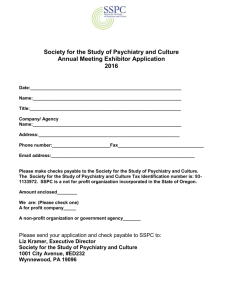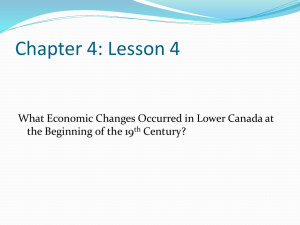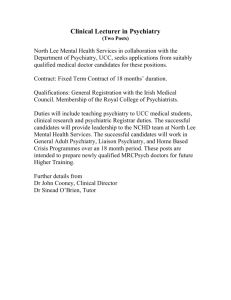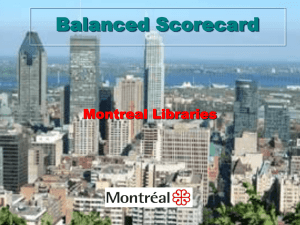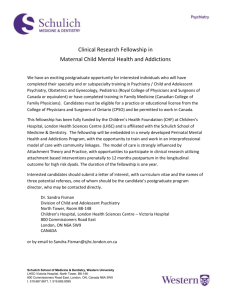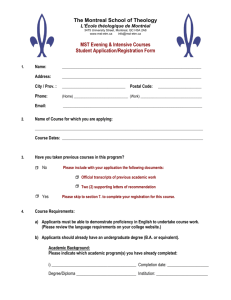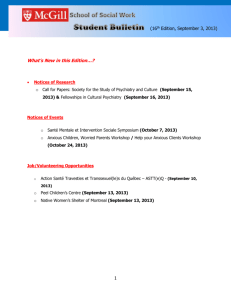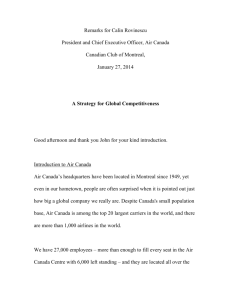Varuni Ganepola - McGill University
advertisement
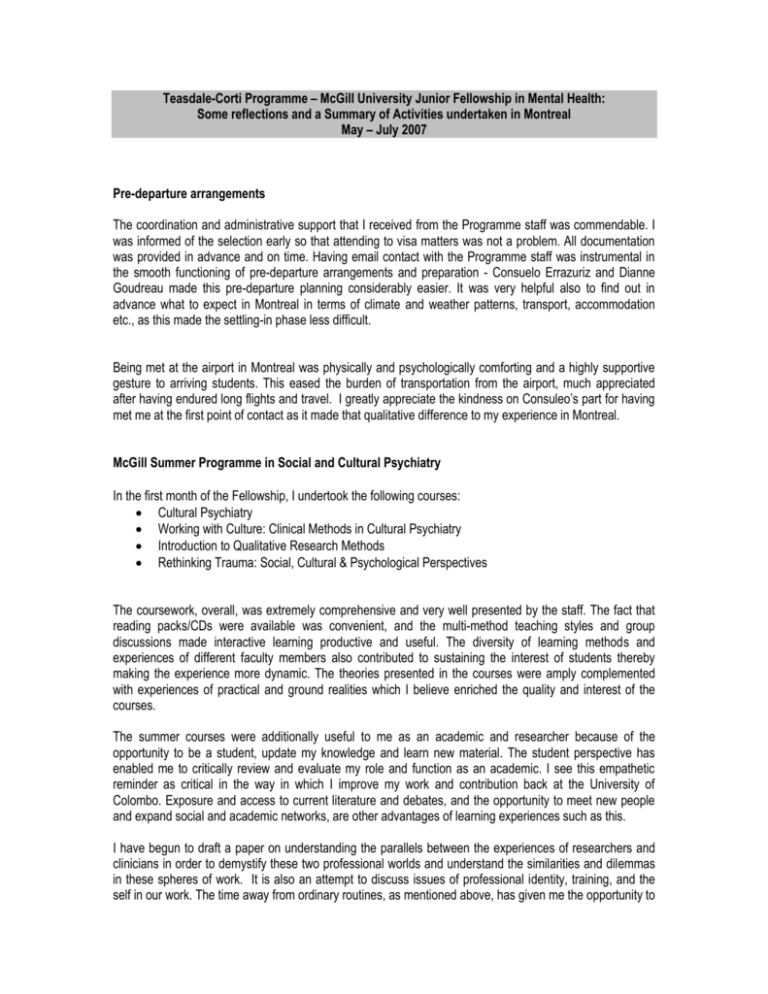
Teasdale-Corti Programme – McGill University Junior Fellowship in Mental Health: Some reflections and a Summary of Activities undertaken in Montreal May – July 2007 Pre-departure arrangements The coordination and administrative support that I received from the Programme staff was commendable. I was informed of the selection early so that attending to visa matters was not a problem. All documentation was provided in advance and on time. Having email contact with the Programme staff was instrumental in the smooth functioning of pre-departure arrangements and preparation - Consuelo Errazuriz and Dianne Goudreau made this pre-departure planning considerably easier. It was very helpful also to find out in advance what to expect in Montreal in terms of climate and weather patterns, transport, accommodation etc., as this made the settling-in phase less difficult. Being met at the airport in Montreal was physically and psychologically comforting and a highly supportive gesture to arriving students. This eased the burden of transportation from the airport, much appreciated after having endured long flights and travel. I greatly appreciate the kindness on Consuleo’s part for having met me at the first point of contact as it made that qualitative difference to my experience in Montreal. McGill Summer Programme in Social and Cultural Psychiatry In the first month of the Fellowship, I undertook the following courses: Cultural Psychiatry Working with Culture: Clinical Methods in Cultural Psychiatry Introduction to Qualitative Research Methods Rethinking Trauma: Social, Cultural & Psychological Perspectives The coursework, overall, was extremely comprehensive and very well presented by the staff. The fact that reading packs/CDs were available was convenient, and the multi-method teaching styles and group discussions made interactive learning productive and useful. The diversity of learning methods and experiences of different faculty members also contributed to sustaining the interest of students thereby making the experience more dynamic. The theories presented in the courses were amply complemented with experiences of practical and ground realities which I believe enriched the quality and interest of the courses. The summer courses were additionally useful to me as an academic and researcher because of the opportunity to be a student, update my knowledge and learn new material. The student perspective has enabled me to critically review and evaluate my role and function as an academic. I see this empathetic reminder as critical in the way in which I improve my work and contribution back at the University of Colombo. Exposure and access to current literature and debates, and the opportunity to meet new people and expand social and academic networks, are other advantages of learning experiences such as this. I have begun to draft a paper on understanding the parallels between the experiences of researchers and clinicians in order to demystify these two professional worlds and understand the similarities and dilemmas in these spheres of work. It is also an attempt to discuss issues of professional identity, training, and the self in our work. The time away from ordinary routines, as mentioned above, has given me the opportunity to reflect on my work and also spend some time on the current workload that I have undertaken. For example, I was able to work on and finalise certain aspects of a collaborative research project undertaken with the University of London (currently in the design and planning stage) on child mental health needs and services in Sri Lanka. Other Activities – Jewish General Hospital, Research, and Workshops From June, I was attached to the Community and Family Psychiatry Unit at the Jewish General Hospital. What has been the most important and useful learning task for me was to attend family assessment sessions (consultations) with my supervisor Dr Jaswant Guzder. The exposure to clinical work, which I had not undertaken since my undergraduate internships, has truly added a new dimension to my career and outlook. This exciting rediscovery of clinical work and has opened up new possibilities and directions for the future. For academics like myself, a first-hand understanding of clinical work has widened the way I perceive social issues within family and social contexts, as well as the practical complexities behind the theory that is taught. I also understand why it is critical to work with the whole family, instead of focusing only on the symptom-bearing children with learning/behavioural/emotional difficulties. Dr. Guzder remained accommodating and encouraged me to attend diverse activities that her Programme at the Hospital offers. Some of these activities include exposure to the day school treatment programme for children, attending the graduation ceremony of Kindergarten children in the treatment programme, the opportunity to meet Sri Lankan families in a family therapy setting and help out in culture-brokering and translations, as well as meeting families with different ethnic orientations and family situations. I have learned much about styles and techniques of working with families in a non-threatening and effective manner, about therapeutic alliances, transmission of trauma etc from an exceptional and extraordinary therapist to whom I owe much. At the Jewish General Hospital, I attended Cultural Consultation Service (CCS) meetings on Fridays and some of the research seminars held on Wednesdays. I also attended the Advanced Study Institute conference on “Psychopharmacology in a Globalising World: The Social Lives of Psychiatric Medication” held at the Institute of Community and Family Psychiatry. Dr. Guzder also had me invited to participate at a workshop on “Overcoming Challenges and Creating Opportunities in Vancouver and Montreal” which discussed issues of health systems in diverse communities. In addition, I have been actively involved in a research study headed by Drs. Ghosh and Guzder that looks at educational achievements and mental health issues of South Asian immigrant and refugee children/parents in Quebec. I also helped modify and translate some of the questionnaires and survey instruments that will be used to collect data. Conclusions I welcomed the combination of structure and flexibility that was a hallmark of the Fellowship. The summer courses were rigorous and met the expectations of a demanding but superior education; the following two months allowed me the opportunity to be self-motivated and self-directed. In conclusion, I wish to thank Dr. Pederson for his tremendous support and friendship, Dr. Kirmayer for his cooperation, and Dr. Fernando for his encouragement throughout. I appreciate that you have all offered me this opportunity for personal growth and development at an important stage of my life. To Consuelo, I greatly appreciate the warm friendship, hospitality, and efficiency from general advice to banking issues, and Dianne Goudreau for her inimitable camaraderie and assistance. To Dr. Guzder, I am indebted for the crucial academic and clinical knowledge that I have gained. Varuni Ganepola Montreal, Canada 26 July 2007

